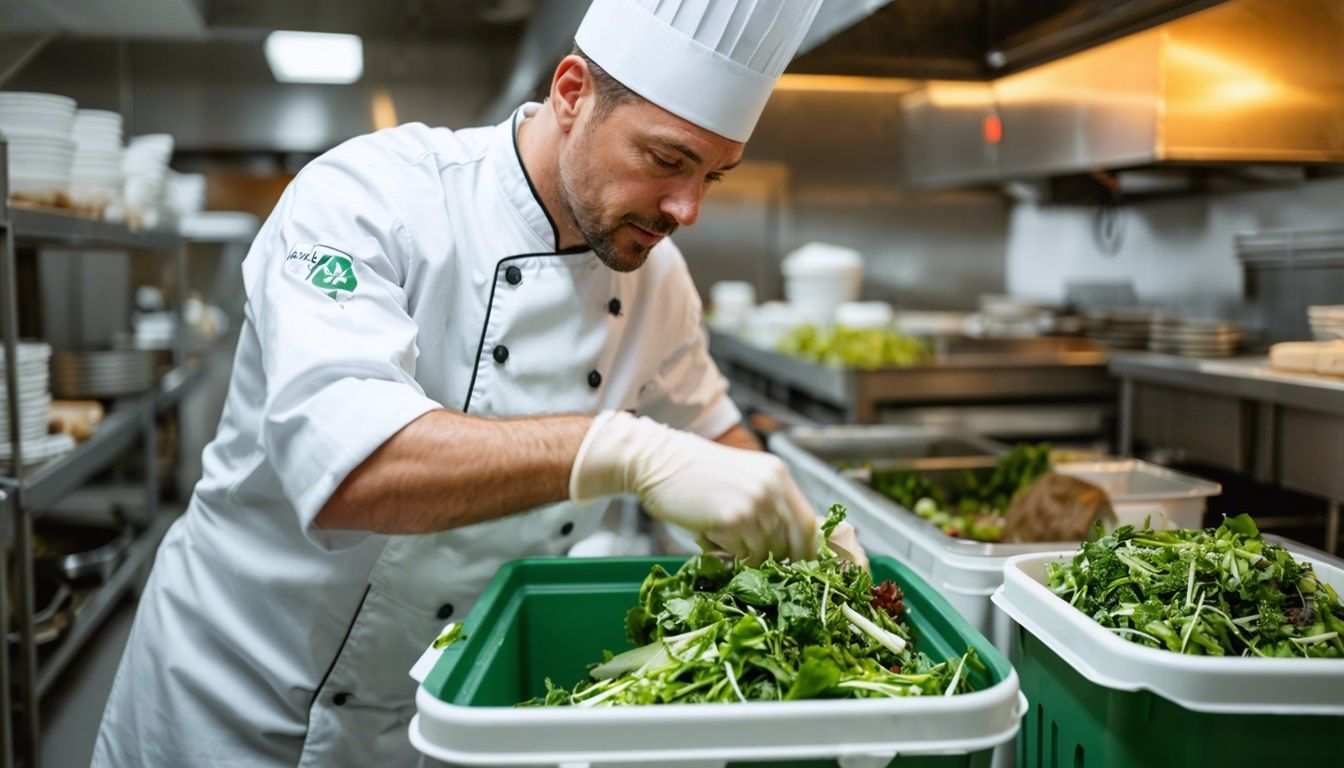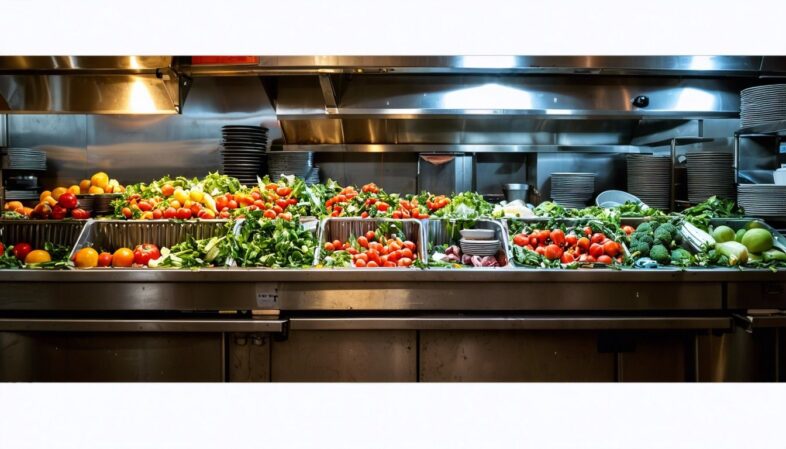Many restaurant owners in the UK struggle with understanding food waste disposal regulations. Each year, British eateries contribute over 199,000 tonnes of waste. This article will explain these regulations and offer clear guidance on how to comply.
Dive in to learn more about managing your restaurant’s waste efficiently!
Key Takeaways
- UK restaurants must follow strict food waste disposal regulations to maintain hygiene and avoid hefty fines. Non-compliance can damage a business's reputation.
- Proper waste segregation includes using separate storage containers for different types of waste like animal by-products and recyclable materials. Colour-coded bins simplify this process for staff.
- Sending food waste to landfill should be avoided due to its environmental impact, including increased methane emissions. Instead, consider composting, biofuels, or donating surplus food to charities.
- Effective inventory management and portion control can reduce the amount of generated food waste significantly, supporting sustainability efforts in the restaurant industry.
What are the UK Food Waste Disposal Regulations?

The UK Food Waste Disposal Regulations ensure food businesses dispose of waste safely and legally. These rules help protect public health and reduce environmental pollution.
How they affect food businesses
UK food waste disposal regulations impact food businesses significantly. Restaurants must follow strict rules to manage their kitchen waste, ensuring safety and hygiene. Ignoring these regulations can lead to hefty fines and damage a business's reputation.
Proper disposal prevents health risks and avoids attracting pests.
Businesses need separate storage for different types of waste, including animal by-products. Frequent bin emptying helps maintain cleanliness. Complying with these rules also lowers environmental impact by reducing landfill use and methane emissions from rotting food.
This approach aligns with customer expectations for sustainable practices in the industry.
Importance for food safety
Food safety is crucial. Improper disposal of food waste can lead to contamination. Restaurants must ensure food waste does not mix with fresh food. This reduces the risk of spreading harmful bacteria and pests.
Regulations guide businesses on safe disposal methods. For example, catering waste containing animal by-products requires special handling. Compliance helps protect both public health and the environment.
Simple measures, like separate storage containers for different types of waste, enhance hygiene significantly.
The risk groups for former foodstuffs
Some former foodstuffs pose higher risks for waste disposal. For instance, raw meat and animal by-products need careful management due to the dangers they present. Wrong handling can lead to serious health hazards like contamination and disease outbreaks.
Cured meats such as salami or bacon also fall into this category. These items must be disposed of following strict UK regulations. Proper disposal helps protect public health and ensures compliance with laws on catering waste.
How to Dispose of Catering Waste
Restaurants must follow strict rules to dispose of catering waste correctly. Proper disposal methods help protect the environment and public health.
Best practices
Food waste should be separated from other rubbish. Use different bins for organic waste, recyclables, and general trash. This ensures proper disposal and reduces contamination risks.
Consider composting systems for biodegradable materials like vegetable peels or coffee grounds. Composting helps create nutrient-rich soil. “Turning food scraps into soil enriches gardens while reducing landfill use.”.
Send inedible animal by-products to rendering facilities as required by the law. Ensure all employees are trained on proper loading and unloading protocols to maintain hygiene.
Invest in inventory management to track food usage closely, which can minimise waste generation. Keep food at safe temperatures with appropriate storage methods in fridges and freezers to reduce spoilage.
Use biogas digesters for leftover food waste where possible, transforming it into renewable energy that benefits the environment.
Sending food waste to landfill
Both practical and eco-friendly methods should be considered when disposing of catering waste. Sending food waste to landfill should be the last option. Landfills contribute significantly to greenhouse gas emissions, which harm the environment.
In 2023, dumping over 199,000 tonnes of food waste from UK restaurants yearly is unsustainable. Strict regulations exist under the Environmental Protection Act 1990 to guide proper disposal.
Failure to comply can lead to hefty fines and health risks. By aiming for alternatives like anaerobic digestion or composting bins, restaurants can reduce their environmental footprint and support soil health with nutrient-rich compost.
Returning food or former foodstuffs
Returning food or former foodstuffs to suppliers is a key practice in waste management. It helps reduce the amount of waste sent to landfill sites, aligning with sustainability goals.
Restaurants must check for agreements with suppliers that allow returns. Some suppliers may reuse these items or process them into animal feed, contributing to a circular economy.
It's essential for restaurant owners to ensure returned goods are handled safely and hygienically. Separate storage containers must be provided for these materials to prevent cross-contamination.
Clear labelling and following loading/unloading protocols can mitigate health risks associated with improper disposal practices, while also supporting environmental sustainability efforts.
Loading and unloading protocols
Loading and unloading food waste requires strict protocols to ensure hygiene and safety. Employees must use personal protective equipment (PPE) like gloves and aprons during these operations.
Vehicles dedicated to transporting waste should be cleaned regularly to prevent contamination.
Special areas for loading and unloading food waste are necessary. These areas should have enough space to manoeuvre bins easily without spillage. Signs marking these zones help staff stay organised, reducing risks of cross-contamination.
Separate storage and disposal containers
Separate storage and disposal containers play a crucial role in managing food waste within UK restaurants. Restaurants generate over 199,000 tonnes of food waste annually. Using designated bins can streamline the process and comply with regulations.
For example, cross-contamination risks drop when meat or dairy doesn't mix with vegetable scraps.
Employing colour-coded bins makes segregation easier for staff. A green bin for compostable materials and a red one for non-biodegradable items like single-use plastic helps maintain order.
Ensuring that each type of waste has its own container enhances not only hygiene but also efficiency in disposal practices.
Managing Restaurant Waste
Managing Restaurant Waste:
Proper waste management is crucial for restaurants. Adhering to UK laws ensures efficient and sustainable practices.
Types of waste
Restaurants produce many types of waste. These include food waste, packaging waste, and single-use plastics. Food waste covers leftovers, expired items past their use-by date, and unused ingredients like vegetables or potatoes.
In the UK alone, restaurants contribute over 199,000 tonnes of food waste each year.
Packaging waste involves materials like plastic containers and pizza boxes. Single-use plastics are items such as disposable cutlery and plastic wrappers. Managing these different wastes effectively reduces environmental impact and meets waste management regulations in the UK.
Next: Laws and regulations in the UK
Laws and regulations in the UK
Waste management in the UK requires adherence to numerous laws. The Environmental Protection Act 1990 is one of the key regulations guiding food waste disposal. Restaurants must comply with this act to ensure safe and hygienic practices.
Violating these can lead to fines or legal action.
Catering businesses have specific rules regarding animal by-products. These items need special handling due to health risks. Using separate storage containers for different waste types helps maintain hygiene standards.
Following these regulations not only ensures safety but also supports environmental protection efforts.
Waste management strategies
Restaurants can reduce food wastage by following effective waste management strategies. Implementing portion control ensures that meals are right-sized, reducing leftover food. Using biodegradable packaging helps in minimising waste and supports sustainable practices.
Separate storage containers for recyclable materials like glass and paper make sorting easier. Regularly empty bins to avoid overflow and maintain hygiene. Many businesses now send organic waste to urban farms or compost facilities instead of landfills, further aiding sustainable agriculture efforts while cutting down on landfill disposal costs.
Common waste disposal methods
Restaurants in the UK must follow several waste disposal methods to manage food waste sustainably. Composting is a popular method, turning organic waste into nutrient-rich soil. This reduces landfill use and supports local agriculture.
Another option is using bio-fuels, which can power vehicles and machinery with energy from food scraps.
Recycling centres help restaurants dispose of materials like glass and plastic properly. These centres ensure that these items are reused instead of ending up in landfills. Incineration is another method but less favourable due to its impact on climate change.
Restaurants often freeze surplus food to extend its shelf life or donate usable items to charities, reducing overall wastage.
Ensuring separate storage for different types of waste is crucial for hygiene and compliance with regulations like the Environmental Protection Act 1990. Special containers should be used for clinical or hazardous wastes to prevent contamination and comply with safety standards.
Frequency of bin emptying
Effective waste management strategies often include regular bin emptying. This prevents overflowing and maintains a hygienic environment. Food businesses must consider the volume of waste generated daily when planning this schedule.
Frequent bin emptying helps reduce odours, avoid pests, and comply with regulations. It's important for maintaining food safety standards and ensuring waste is disposed of before it becomes a health hazard.
Properly timed bin collections can also make food waste recycling more efficient, supporting sustainable practices within the restaurant industry.
Interesting Facts and Statistics
Reducing food waste can save businesses thousands of pounds each year. Food waste is a major contributor to greenhouse gas emissions, underscoring its environmental impact.
Impact of food waste on the environment
Food waste in the UK restaurants contributes significantly to environmental harm. Over 199,000 tonnes of food get wasted each year. This large volume leads to increased methane emissions from landfills, which is more harmful than carbon dioxide.
Methane exacerbates global warming and climate change.
Apart from greenhouse gases, discarded food also results in habitat destruction. The production of wasted food involves high water usage and energy consumption, draining vital resources unnecessarily.
Reducing restaurant food waste helps protect the environment by conserving these resources and mitigating pollution levels.
Cost of food waste for businesses
Wasting food costs UK businesses billions each year. Restaurants, in particular, contribute to over 199,000 tonnes of wasted food annually. This waste not only impacts the environment but also hits profit margins hard.
Ditching perfectly good ingredients harms budgets and adds extra disposal costs. Food that ends up as landfill creates greenhouse gases like methane. By implementing better waste management strategies, restaurants can save money and support a more sustainable future.
Reducing waste can also align with customer expectations for environmentally friendly practices. Compliance with regulations ensures safe disposal while reducing health risks and environmental impact.
Efforts to reduce food wastage benefit both the business and the planet.
Using renewable energy options such as bio diesel from discarded cooking oil can turn a cost into energy production savings. The Environmental Protection Act 1990 guides these processes, ensuring proper handling of former foodstuffs and household waste alike.
Customer expectations and future legislation
The cost of food waste for businesses is high, pushing many to seek better solutions. Customers are increasingly demanding that restaurants reduce their environmental footprint. They expect eateries to adopt sustainable waste management practices and use eco-friendly packaging.
Future legislation aims to further regulate food disposal methods. The Environmental Protection Act 1990 already sets out requirements. New laws may introduce stricter measures, such as increased recycling rates and penalties for non-compliance.
These changes will require restaurant owners to stay informed and adapt quickly.
Conclusion
Understanding UK restaurant food waste disposal regulations helps keep your restaurant compliant. Following these rules ensures safe and hygienic practices. Implementing the strategies mentioned is practical and efficient for any size business.
Reducing food waste not only protects the environment but also saves money on waste costs. Many resources are available to help guide you further in managing food disposal effectively.
Make a change today and contribute to a greener future!
FAQs
1. What are the UK restaurant food waste disposal regulations?
The UK restaurant food waste disposal regulations aim to reduce, reuse, and recycle waste to protect the environment under the Environmental Protection Act 1990.
2. How can restaurants reduce food waste?
Restaurants can reduce food waste by using sustainable packaging, freezing leftovers like sausages or beef, and following a closed-loop system for reusable items.
3. What is the importance of recycling in these regulations?
Recycling helps turn waste into renewable energy generation at treatment plants and reduces reliance on fossil fuels.
4. Are there specific rules for clinical and compostable waste in restaurants?
Yes, clinical waste must be handled separately from composted materials to ensure safety and proper treatment at recycling centres or designated disposal sites.
5. How do these regulations impact takeaway services?
Takeaway services must use recyclable or sustainable packaging to comply with extended producer responsibility guidelines aimed at reducing environmental impact.






